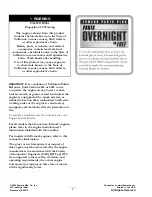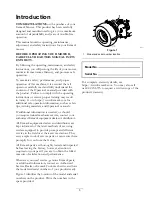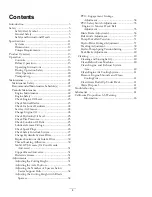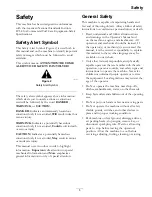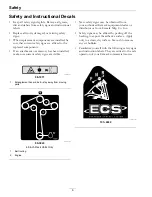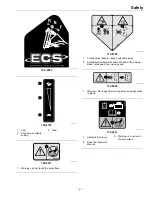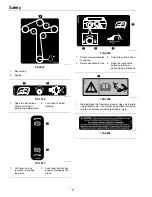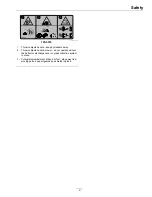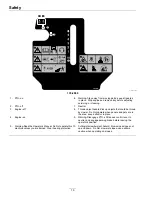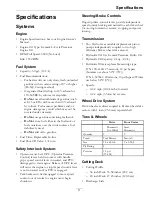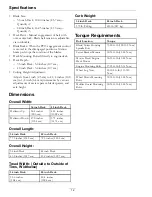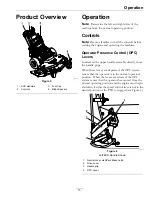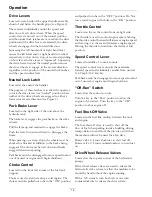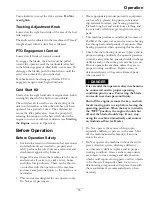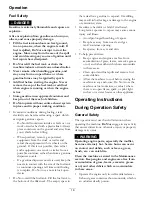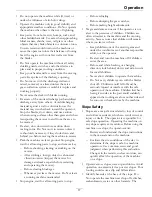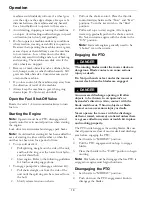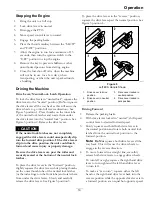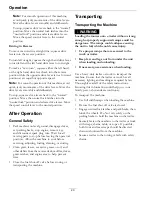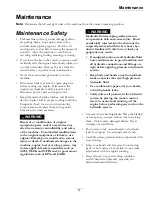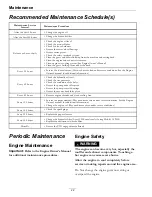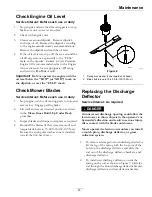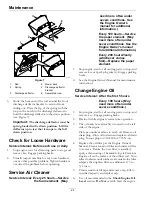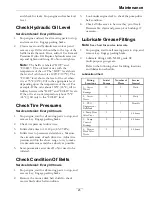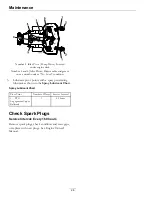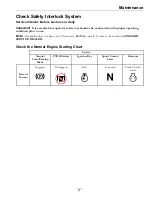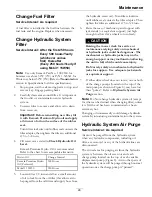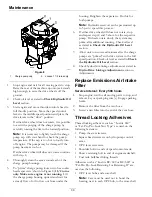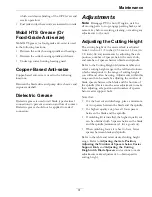
Operation
Fuel Safety
DANGER
Gasoline is extremely flammable and vapors are
explosive.
A fire or explosion from gasoline can burn you,
others, and cause property damage.
•
Fill the fuel tank outdoors on level ground,
in an open area, when the engine is cold. If
fuel is spilled, Do Not attempt to start the
engine. Move away from the area of the spill
and avoid creating any source of ignition until
fuel vapors have dissipated.
•
Do Not refill the fuel tank or drain the
machine indoors or inside an enclosed trailer.
•
Never smoke when handling gasoline, and
stay away from an open flame or where
gasoline fumes may be ignited by spark.
•
Add fuel before starting the engine. Never
remove the cap of the fuel tank or add fuel
when engine is running or when the engine
is hot.
•
Store gasoline in an approved container and
keep it out of the reach of children.
•
Do Not operate without entire exhaust system
in place and in proper working condition.
•
In certain conditions during fueling, static
electricity can be released causing a spark which
can ignite gasoline vapors.
– Do Not fill containers inside a vehicle or on a
truck or trailer bed with a plastic liner. Always
place containers on the ground and away from
your vehicle before filling.
– When practical, remove gas-powered
equipment from the truck or trailer and
refuel the equipment with its wheels on the
ground. If this is not possible, then refuel
such equipment on a truck or trailer from a
portable container, rather than from a gasoline
dispenser nozzle.
– If a gasoline dispenser nozzle is used, keep the
nozzle in contact with the rim of the fuel tank
or container opening at all times until fueling
is complete. Do Not use a nozzle lock open
device.
•
Do Not overfill the fuel tank. Fill the fuel tank to
the bottom of the filler neck. The empty space in
the tank allows gasoline to expand. Overfilling
may result in fuel leakage or damage to the engine
or emission system.
•
Gasoline is harmful or fatal if swallowed.
Long-term exposure to vapors may cause serious
injury and illness.
– Avoid prolonged breathing of vapors.
– Keep face away from nozzle and gas
tank/container opening.
– Keep away from eyes and skin.
•
To help prevent fires:
– Keep engine and engine area free from
accumulation of grass, leaves, excessive grease
or oil, and other debris which can accumulate
in these areas.
– Clean up oil and fuel spills and remove fuel
soaked debris.
– Allow the machine to cool before storing the
machine in any enclosure. Do Not store the
machine or fuel container, or refuel, where
there is an open flame, spark, or pilot light
such as on a water heater or other appliance.
Operating Instructions
During Operation Safety
General Safety
The operator must use their full attention when
operating the machine.
Do Not
engage in any activity
that causes distractions; otherwise, injury or property
damage may occur.
WARNING
Operating engine parts, especially the muffler,
become extremely hot. Severe burns can occur
on contact and debris, such as leaves, grass,
brush, etc. can catch fire.
Clean the machine as stated in the Maintenance
section. Keep engine and engine area free from
accumulation of grass, leaves, excessive grease
or oil, and other debris which can accumulate
in these areas.
•
Operate the engine only in well-ventilated areas.
Exhaust gases contain carbon monoxide, which is
an odorless deadly poison.
16
Содержание VIKING 346
Страница 1: ...VIKING For Serial Nos 408 644 346 Higher Part No 4505 182 Rev A ...
Страница 45: ...Schematics g010189 45 ...
Страница 47: ...47 ...

